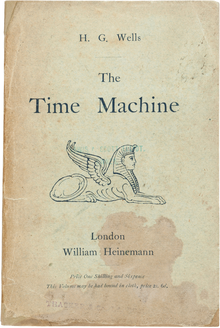
Back السفر عبر الزمن Arabic Viaxe al traviés del tiempu AST Zaman səyahəti Azerbaijani Пътуване във времето Bulgarian সময় ভ্রমণ Bengali/Bangla Viatge en el temps Catalan Pagpanaw sa panahon CEB گەشت بەناو کاتدا CKB Cestování v čase Czech Tidsrejse Danish

Time travel is the hypothetical activity of traveling into the past or future. Time travel is a concept in philosophy and fiction, particularly science fiction. In fiction, time travel is typically achieved through the use of a device known as a time machine. The idea of a time machine was popularized by H. G. Wells's 1895 novel The Time Machine.[1]
It is uncertain whether time travel to the past would be physically possible. Such travel, if at all feasible, may give rise to questions of causality. Forward time travel, outside the usual sense of the perception of time, is an extensively observed phenomenon and is well understood within the framework of special relativity and general relativity. However, making one body advance or delay more than a few milliseconds compared to another body is not feasible with current technology. As for backward time travel, it is possible to find solutions in general relativity that allow for it, such as a rotating black hole. Traveling to an arbitrary point in spacetime has very limited support in theoretical physics, and is usually connected only with quantum mechanics or wormholes.
- ^ Cheng, John (2012). Astounding Wonder: Imagining Science and Science Fiction in Interwar America (illustrated ed.). University of Pennsylvania Press. p. 180. ISBN 978-0-8122-0667-8. Archived from the original on March 24, 2023. Retrieved November 18, 2019. Extract of page 180 Archived 2023-03-24 at the Wayback Machine